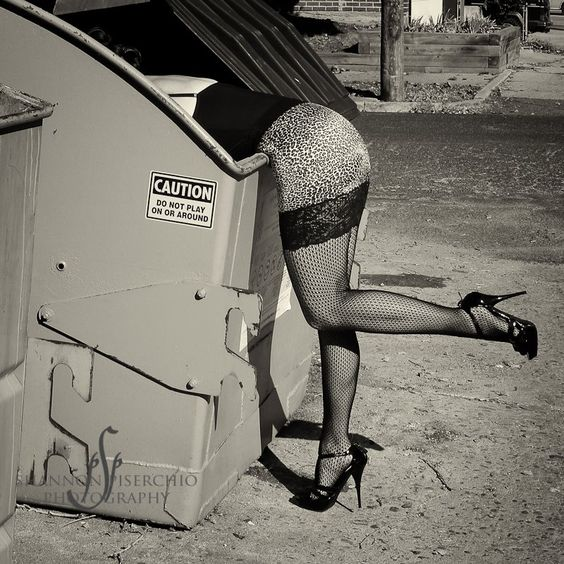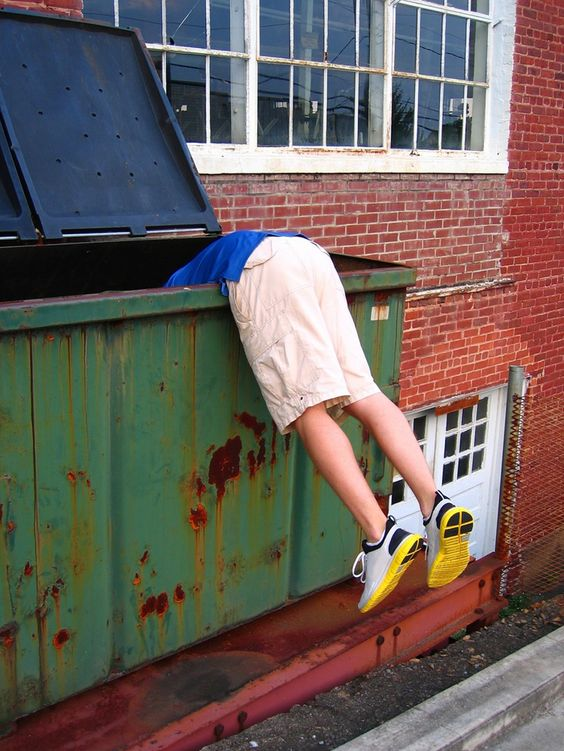New In: Dumpster Diving
Food waste is a problem. Rising food prices are a problem. Overall, sourcing food has become a struggle, especially in cities. Dumpster divers are shaking things up by searching for untouched food in the concrete jungles.
Dumpster Diving, Pinterest
Food has become more of a hassle than a source of enjoyment for many. With inflation, food shortages, and climate change brewing, this seems understandable. These challenges have led to a rise in sustainable living trends, influencing how people source their food. Creativity in food sourcing has sparked the formation of various strategies and communities. One practice that has been around for a while but has recently gained popularity among younger generations is dumpster diving. Though highly controversial, dumpster diving is an intriguing phenomenon. It involves retrieving untouched food from dumpsters, primarily from large supermarkets. However, this practice is illegal in some countries due to trespassing concerns. But what are the real issues here? The potential health risks? The legal complications? Or the general misconceptions these sustainable communities face?
Sourcing untouched food from dumpsters is a challenging task. However, there are large communities of people who believe it is worth the risk. Dumpster diving is a sustainable way of living as it helps reduce food waste. Supermarkets throw away lots of untouched food every day. If, instead of purchasing more fresh food, people consumed this so-called food waste, it would help break this cycle and minimize the environmental impact. Talking about a vicious cycle, dumpster diving has significant economic benefits. It provides free food for those in need or for communities participating in the activity. As food prices skyrocket, it is no wonder people want to save a few bucks. Although dumpster diving is not a new concept, it has recently gained popularity. Social media has played a big role in this, creating an outlet for people and allowing a space to get in contact and foster communities. It provides easy access to like-minded individuals and facilitates the sharing of information, helping coordinate the dives. However, diving for food is not all sunshine and roses.
There are many factors to consider when contemplating dumpster diving. One of the more significant risks divers face surrounds legal issues in the form of trespassing concerns. Dumpster diving often involves trespassing, which can lead to fines or arrests. Although the laws differ from country to country, most divers risk facing such consequences. Regarding consequences, the food acquired might seem fresh and untouched, but it is never certain. If unlucky, divers can face dire health risks, such as foodborne illnesses, from consuming food from dumpsters. Besides physical consequences, there is a negative stigma attached to dumpster diving. People often view this activity negatively, especially evident on social media through critique where such perceptions are easily shared. Some people misunderstand the practice, downgrading the communities. However, it is not only on social media that divers face this attitude. Unless involved in the practice themselves, it can be difficult to share with friends or family for fear of judgment. This makes the communities even more important, as people wish to partake in this activity without facing ridicule. With dumpster diving, there is a lot to unpack.
Dumpster Diving, Pinterest
Dumpster diving is far from the only alternative sustainable lifestyle that has risen in popularity. Activities like urban foraging have become a hit in the cities. It involves harvesting plants and fruits found in parks, sidewalks, and other urban areas. Even Detroit is transitioning from being a large industrial city to embarking on a mission to reshape its landscape. The city is adding 'agrihoods' by transforming abandoned building areas into sustainable community centers. Now, that is a positive change. While living sustainably in rural areas or the countryside may be easier, it's a different challenge in bustling cities. But that won’t stop certain people and communities determined to find a way, viewing the urban landscape from a sustainable perspective. Interestingly, we are now experiencing an expansion of dumpster divers as the stigma around this practice begins to shift. Once upon a time, in 2011 (that’s 13 years ago), TLC released a documentary about dumpster diving called 'Cheapskates.' This documentary shed light on the practice, showcasing the divers and their sustainable lifestyles both positively and negatively. It focused on the divers’ stories and their challenges, but it often portrayed them as quite unconventional and quirky. Now, we are witnessing a change in perception. Social media has played a large role in positively reshaping public opinion by sharing information and explaining this lifestyle properly. So what do we think? How would you react if you went to a friend's place and they served a delicious dumpster-diving meal? Or would you be brave enough to try it out for yourself?


